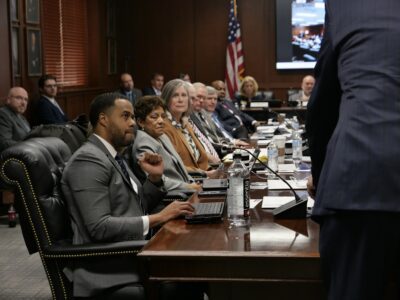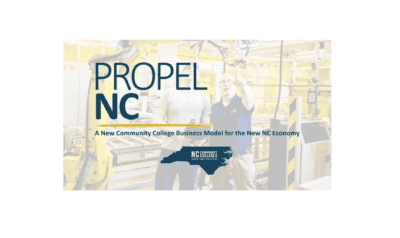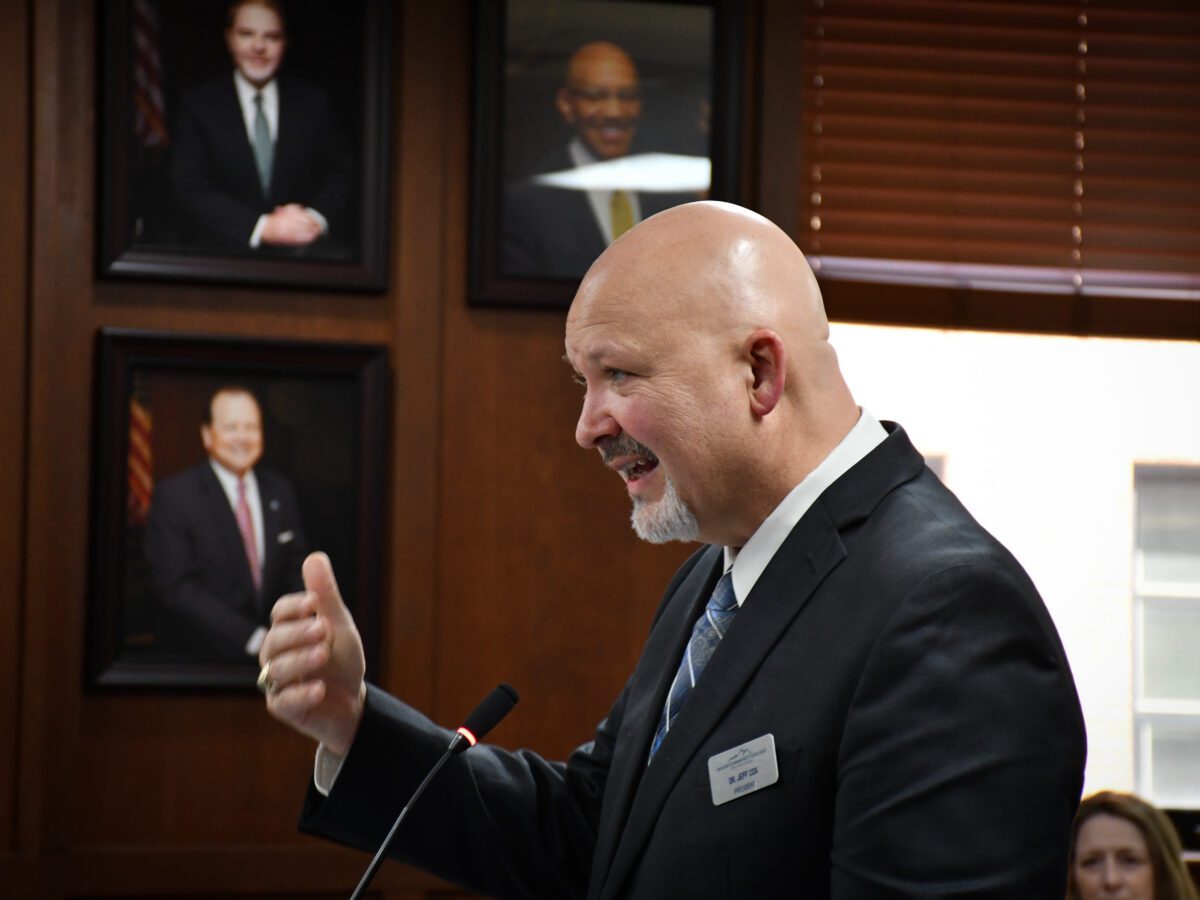
|
|
The N.C. Community College System’s (NCCCS) primary legislative request this short session is money for Propel NC, the system’s new funding model proposal. The request includes a nearly $100 million price tag for Fiscal Year (FY) 2024-25.
The State Board of Community Colleges unanimously approved the new plan in February, five months after the system officially began work in August to revise its funding model. The NCCCS’ current state funding model was created in 2010 and last updated in 2013.
“This is labor-market driven and where we need to be,” Finance Committee Chair Lisa Estep said in February. “It’s a much needed shift.”
The vast majority of funding for the state’s 58 community colleges comes from state appropriations.
The system’s current funding model allocates resources to the colleges in proportion to the number of full-time equivalent (FTE) students they enroll in each of their programs. Certain courses receive more state funds than others based on a four-tier funding model.
Propel NC would shift the current FTE funding tiers to “workforce sectors,” with courses ranked and valued by statewide salary job demand data every three years. All curriculum and continuing education (CE) courses would reside in the same workforce sector. The NCCCS says this shift “prioritizes connecting students to high-demand, high-wage jobs.”
The anticipated cost of this component of the model is approximately $68.6 million, according to the system.
“The change from tiers to workforce sectors does more than bring in new dollars and simplify our categories,” Richmond Community College President Dr. Dale McInnis wrote in an EdNC perspective. “It changes our business model at the college level. We will be able to make program and course decisions based on the quantified labor market value that education brings to the student as recognized by our state’s employers. The choice of offering a degree or short-term certificate will be driven by the value proposition for the student and the needs of the employers.”
Propel NC includes a $93 million recurring ask to lawmakers, according to a NCCCS document outlining the model. There is a $99 million ask for FY 2024-25.
Here are the other components of the plan:
- Increase in base funding. The plan calls to increase the base allocation for instructional and academic support funds 5.8%, “which closes the gap to actual spending patterns and account for inflation,” per the NCCCS document. “This modification would also increase the enrollment allotment above 750 FTE based on this increase in other costs funding.” The anticipated cost for this request is about $24.4 million.
- Enrollment increase reserve. The current enrollment growth reserve was implemented in 2010 in response to the large number of students enrolling in community colleges after the Great Recession. The system wants to request $6 million in non-recurring funds for a fixed per-FTE amount for any colleges that go over the enrollment threshold set by their FTE for the fiscal year. The system would then like to build replenishment of the fund into the recurring enrollment growth fund in the state budget.
- Excess tuition retention. Excess tuition receipts currently fund the enrollment increase reserve. Propel NC would change that, allowing excess tuition receipts to return to the college which generated them but only on years when the system as a whole generates excess receipts.
You can view more details about Propel NC, including projections for the proposed workforce sectors, here. You can read more about how community colleges are currently funded in this EdExplainer.
What are people saying?
In January, NCCCS leaders said the system had already started meeting with lawmakers about Propel NC. In February, State Board Chair Tom Looney said the system had more than 100 letters of endorsement for the plan from businesses across the state.
“I couldn’t be more proud of where we’ve arrived at this point in time. I think this is a game changer for our system,” NCCCS President Dr. Jeff Cox said in November. “It answers the call that I think we’re hearing from our legislature and our governor about the community colleges’ critical role in meeting the workforce needs of the future of our state. …It aligns our system in a way we’ve just never been before.”
Feedback from lawmakers so far has been positive, NCCCS Information and Communications Specialist Marcy Gardner told EdNC in an email. System leaders plan to continue conversations and advocacy for Propel NC, she said.
“While we hope to get the full funding to launch Propel NC this fall, we are developing contingency plans so that we can be prepared to move forward with whatever level of funding is ultimately approved in the state budget,” Cox told EdNC.
Lt. Gov. Mark Robinson, an ex-officio member of the State Board, expressed his support for the plan at the Board’s January and February meetings. Robinson is the Republican nominee for the 2024 governor’s race.
“Moving from tiers-based to labor-market driven, I would suppose that would give us a lot more flexibility, so I think that’s very good,” Robinson said. “Community colleges are going to be essential (to the economy)… so I’m glad to see the work that’s going on.”
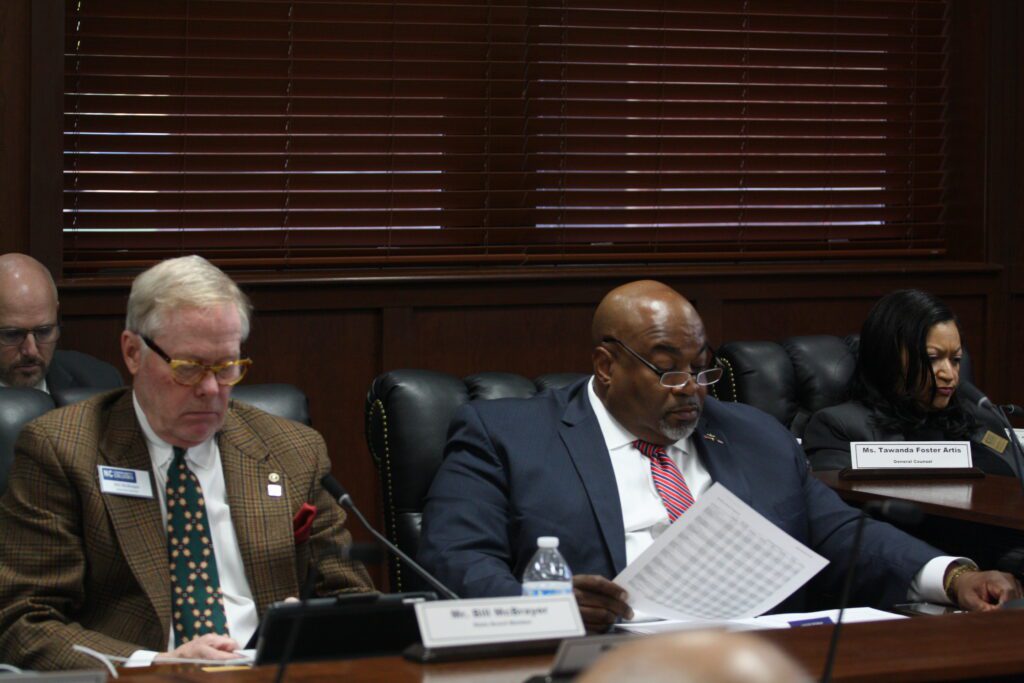
North Carolina has a projected one-time $1.4 billion surplus in state revenues through Fiscal Year (FY) 2025, according to the latest consensus revenue forecast. This essentially means there are $1.4 billion extra state dollars that lawmakers can choose to invest this short session.
With a Republican supermajority this session, Republicans will drive fiscal and policy decisions. On May 1st, the Senate Appropriations Committee approved a bill that would eliminate the waitlist for Opportunity Scholarships, which are state-funded vouchers families can use to pay for eligible private schools. To do so, the bill would allocate roughly an additional $463 million to the program over the next two years.
In addition to expanding vouchers, House Speaker Tim Moore, R-Cleveland, told media he would like to see funding for child care subsidies, additional raises to school and state employees, and an additional $400 million toward Medicaid.
So far, the General Assembly’s only discussions regarding community colleges have involved clarifying terms for how local college board trustees are selected.
Democratic Gov. Roy Cooper’s budget proposal included $34.3 million to implement Propel NC.
“This new funding model will help streamline degree attainment and prepare a well-trained workforce to meet the demands of the State’s growing economy,” the proposal says.
Cooper’s proposal also allocated $3 million to establish the enrollment increase reserve. The governor’s proposal did not including funding to increase the base allocation for colleges.
John Locke Foundation Board Member John Hood also recently made the case for Propel NC in an EdNC perspective.
“Implementing some version of the Propel NC model would require a modest increase in state funds,” he wrote. “Its advocates argue that community colleges not only produce labor-market returns but also serve as critical hubs in local communities. I find their argument persuasive.”
Enrollment growth adjustment
The NCCCS is also requesting an enrollment growth adjustment. This adjustment is usually funded in the budget, but it is not statutorily required.
During the Board’s finance committee meeting in March, the system shared an initial projection of $54 million in enrollment growth. Since then, the system has updated the enrollment growth estimate to $69 million, NCCCS’ Gardner said in an email.
The governor’s proposal included a $25 million enrollment growth adjustment for FY 2024-25, “based on the increase in community college enrollment. Community college enrollment increased by 4.6%, or 10,435 full-time equivalent students.”
myFutureNC’s legislative priorities
Five years ago, myFutureNC announced a statewide attainment goal of 2 million 25- to 44-year-olds with a high-quality credential or postsecondary degree by 2030.
“From 2019 to 2022, the state has increased overall educational attainment by 4 percentage points from 53.4% to 57.4%,” a 2024 myFutureNC report reads. “But, most recent data show we still remain 391,900 away from 2 million, and are tracking 24,096 behind where we needed to be at this point in time to reach the goal.”
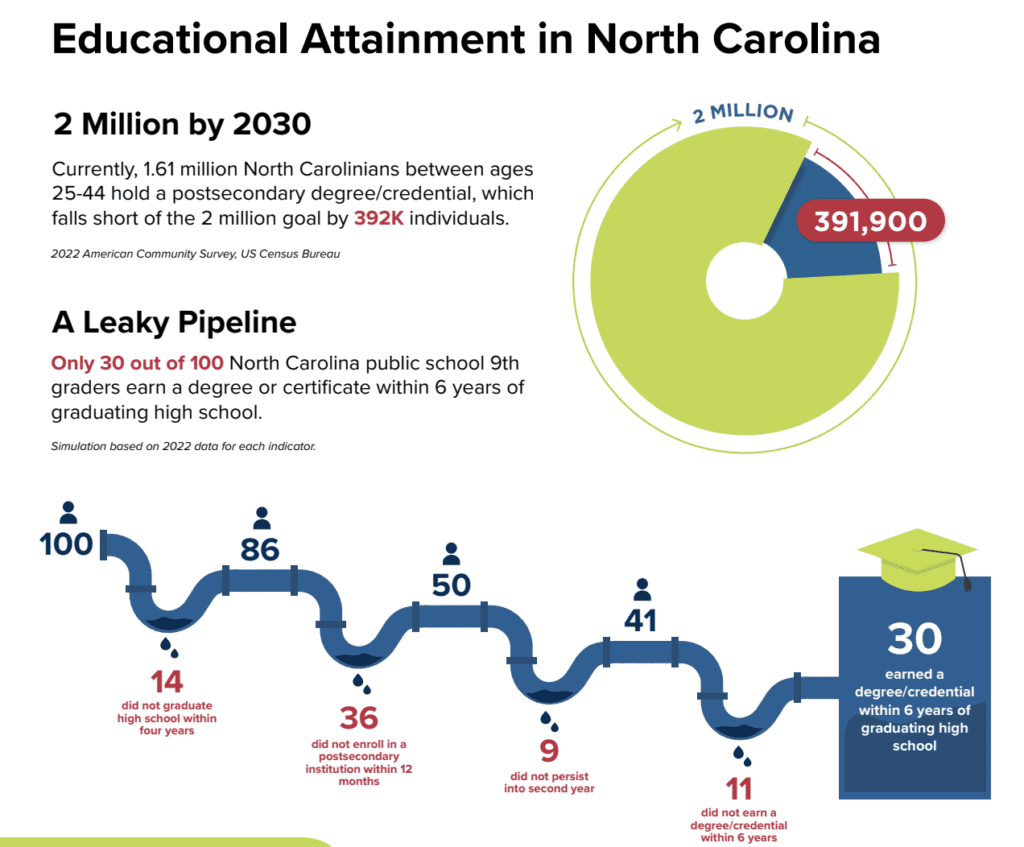
myFutureNC’s 2024 legislative priorities include NC workforce credentials, targeted financial aid provided to all postsecondary students who face unexpected emergencies, and local and regional technical assistance to promote collaboration.
The organization’s legislative request also includes two partner support items:
- Early foundations for success, including NC Pre-K and Science of Reading implementation.
- High-quality implementation of Career Development Plans, integrated through NCcareers.org.
“myFutureNC promotes the work of all sectors and helps find and fill gaps to drive educational access and attainment outcomes that align with and fulfill employer needs,” the document says.
You can read their full priorities here.



